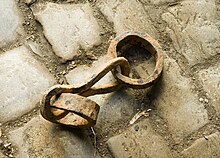User:Lesleysiri/sandbox
“So I was sold at last! A human being sold in the free city of New York! The bill of sale is on record, and future generations will learn from it that women were articles of traffic in New York, late in the nineteenth century of the Christian religion.”

― Harriet Ann Jacobs
Summary
[edit | edit source]
[1] Kindred is a novel by American writer Octavia E. Butler that incorporates time travel and is modeled on slave narratives. First published in 1979, it is still widely popular. It has been frequently chosen as a text for community-wide reading programs and book organizations, as well as being a common choice for high school and college courses.
The book is the first-person account of a young African-Americanwriter, Dana, who finds herself being shunted in time between her Los Angeles, California home in 1976 and a pre-Civil War Maryland plantation. There she meets her ancestors: a proud Black freewoman and a white planter who has forced her into slavery and concubinage. As Dana's stays in the past become longer, she becomes intimately entangled with the plantation community. She makes hard choices to survive slavery and to ensure her return to her own time.
Context
[edit | edit source]Antebellum: The Antebellum Period in American history is generally considered to be the period before the Civil War and after the War of 1812, although some historians expand it to all the years from the adoption of the Constitution in 1789 to the beginning of the Civil War. It was characterized by the rise of abolition and the gradual polarization of the country between abolitionists and supporters of slavery. During this same time, the country’s economy began shifting in the north to manufacturing as the Industrial Revolution began, while in the south, a cotton boom made plantations the center of the economy. The annexation of new territory and western expansion saw the reinforcement of American individualism and of Manifest Destiny, the idea that Americans and the institutions of the U.S. are morally superior and Americans are morally obligated to spread these institutions.[2]
Butler often said she was inspired to write it when she heard young black people minimize the severity of slavery, and strongly assert what they would or would not have tolerated if they were enslaved. She wanted them to not only know the facts of slavery, but how slavery felt. She wanted to make those militant young people see that even surviving such an institution made their ancestors heroic.[3]
Quotes from Kindred
[edit | edit source]"I lost an arm on my last trip home. My left arm. And I lost about a year of my life and much of the comfort and security I had not valued until it was gone"(Butler 1)
"I tried. I showered, washed away the mud and the brackish water, put on clean clothes, combed my hair. . . “That’s a lot better,” said Kevin when he saw me. But it wasn’t."(Butler 18)

"I touched the scar Tom Weylin’s boot had left on my face, touched my empty left sleeve. “I know,” I repeated. “Why did I even want to come here. You’d think I would have had enough of the past.” (Butler 264)
Close Reading and Critical Thinking Questions
[edit | edit source]In Kindred, Butler depicts the community within the slaves and how they come together to help Dana. Without the isolating experience of slavery, do you think the slaves would have still had a sense of community and risk their own lives to help her?
If you were born during the time of slavery would you take the risk of escaping?

What long term effects do you think slavery caused on African American people?
Further Reading
[edit | edit source]
The linked articles and videos below show the struggle and fight for justice that not only African American people experience but minorities as a whole.
[edit | edit source]James Baldwin vs. William F. Buckley
Ta-Nehisi Coates take on Reparations
The long term effects of the African slave trade
Refrences
[edit | edit source]- ↑ “Kindred (Novel).” Wikipedia, Wikimedia Foundation, 16 Dec. 2022, https://en.wikipedia.org/wiki/Kindred_(novel).
- ↑ “The Antebellum Period: Life in America before the Civil War.” HistoryNet, https://www.historynet.com/the-antebellum-period-what-happened-in-america-before-the-civil-war/.
- ↑ Bates, Karen Grigsby. “Octavia Butler: Writing Herself into the Story.” NPR, NPR, 10 July 2017, https://www.npr.org/sections/codeswitch/2017/07/10/535879364/octavia-butler-writing-herself-into-the-story.